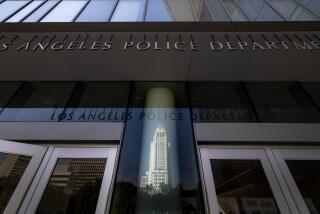Newport Police Brutality Trial Begins : Courts: An executive charges in a $10-million suit that he was yelled at, threatened, beaten, then falsely arrested in 1986.
- Share via
LOS ANGELES — An advertising executive on Thursday accused former Newport Beach police officers of harassing and brutalizing him during a 1986 traffic incident, but the officers contended that they were simply defending themselves on the first day of a federal civil rights trial here.
In his $10-million lawsuit against four officers, two former police chiefs, then-City Council members and the city itself, Everett Temme, 56, has charged that he was yelled at, threatened, beaten, then falsely arrested. Further, he claims that the aggressive behavior was Newport Beach police policy at the time.
The officers, however, have denied that they were rude or violent during the incident. They have accused Temme of being drunk and offering to bribe police in order to avoid arrest.
Named in the lawsuit is former Police Chief Arb Campbell, who was fired in December after 10 current and former Police Department employees accused him and Capt. Anthony J. Villa with sexual harassment and rape in a Superior Court lawsuit.
After the 1986 incident, Temme was arrested for domestic violence in 1988 and filed a separate suit charging Newport Beach police with excessive force in that incident. He lost that case in 1991 and was ordered to pay the defense’s legal fees. Campbell and others currently are suing Temme for wrongful prosecution in that case.
Temme, a Nevada resident who then lived part time on a yacht in Newport Beach’s Marina Dunes area, was heading for his boat in his silver BMW in June, 1986, when he encountered Officers Richard Thomson and Scott McKnight, attorneys said. The officers were directing traffic because of a faulty traffic signal at the intersection of Coast Highway and Bayside Drive, the attorneys told the 12-member jury Thursday in the courtroom of U.S. District Judge Robert G. Takasugi.
Temme contends that he tried to ask the officers’ permission to make a left turn onto Bayside Drive but that they burst into a string of profanities, ignored his question, and signaled him with their flashlights to move forward on Coast Highway.
In testimony Thursday, Thomson said that instead of following orders, Temme accelerated and swerved to the left, nearly hitting him. Thomson told the jury that in response, he threw the foot-long metal police flashlight at the BMW, smashing the rear windshield.
But Temme testified that Thomson tossed the flashlight before Temme made the turn and that he only fled up Bayside Drive because he thought that the officers were shooting at him.
“There was this incredible noise and a shattering of glass--my rear windshield exploded,” Temme told the jury. “I was in fear of my life. My concern was for my safety and to exit that situation.”
Thomson and Temme met again in the marina parking lot about 15 minutes later, after Temme had called the police to report the incident and Thomson had contacted two other officers to assist him in arresting Temme, allegedly for trying to ram the officer with the BMW.
In testimony Thursday, Temme accused the officers of shoving him, bashing his head against the ground and thrusting his head through the broken car windshield with the warning, “You see that flashlight? We got your ass. That will teach you to (expletive) with the Newport Beach Police Department.”
But Thomson and another witness, former Sgt. Michael McEveny, refuted that story, testifying that that they only used force because Temme reeked of alcohol, was staggering and resisted arrest.
“I remember Mr. Temme trying to offer me financial reward if I wouldn’t arrest him,” McEveny, who traveled from his home in Idaho for the trial, told the jury. “He said: ‘You want to make an easy $5,000? We can just forget the whole thing.’ I just laughed because he was drunk.”
Although Temme spent the night in jail, the charges were dropped the next day.
The federal trial will resume Tuesday, and attorneys said they expect it to last four days.
More to Read
Sign up for Essential California
The most important California stories and recommendations in your inbox every morning.
You may occasionally receive promotional content from the Los Angeles Times.













